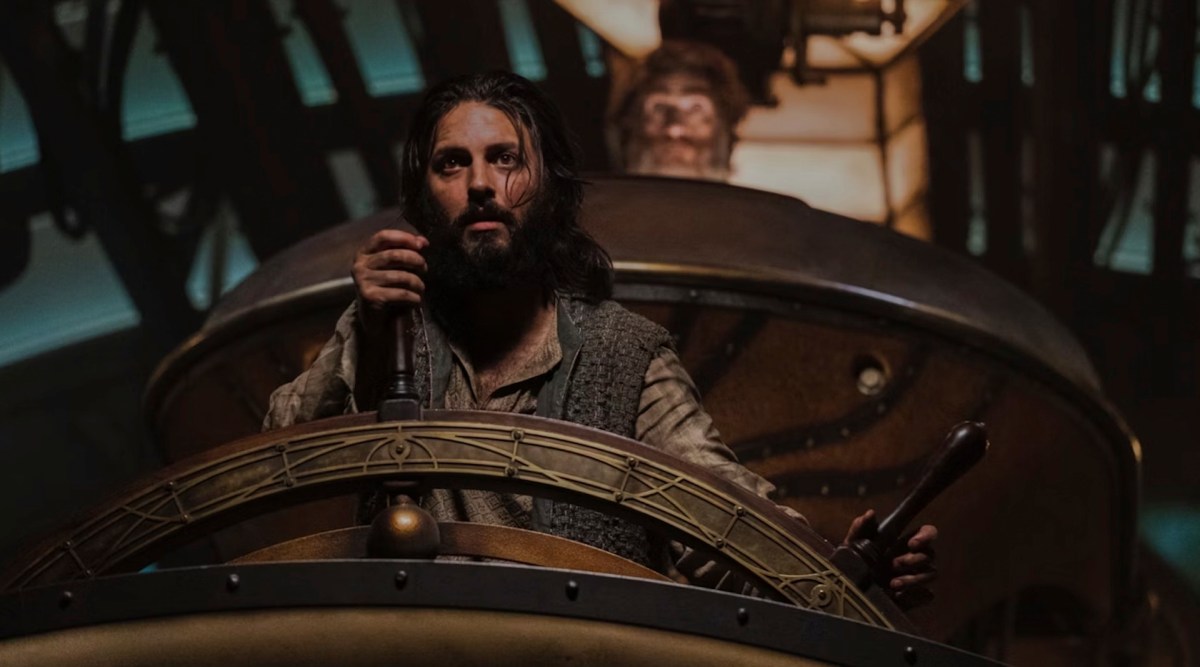This swashbuckling revision of Jules Verne’s 1870 submarine classic was almost sunk before it could launch. Commissioned for Disney+ in 2021, it was lavishly filmed – for $300 million – on the Gold Coast in 2022, with an 80% local cast and crew. But it was spiked in 2023 – a casualty of Bob Iger’s ‘aggressive cost reductions’ when he regained control of Big Mouse.
Happily, Stan has thrown Nautilus a lifeline. So you can now watch a rag-tag bunch of colonial misfits fight giant squids and sea monsters in South-East Asia, travel to the frozen Arctic in search of sunken Viking treasure, and penetrate England’s dark imperial heart.
Watch the Nautilus trailer
Are you up for a mashup of Pirates of the Caribbean and Black Sails with Star Wars and Star Trek? Did you enjoy the eco-warrior whales in Avatar: The Way of Water? Would you like an exotic adventure quest without Dwayne Johnson, or wish Indiana Jones had dialled down the racism and sexism? But do you still enjoy Romancing the Stone screwball bickering? If so, I’ve got 10 episodes of great news for you.
Nautilus isn’t for purists, but it’s well made and solidly entertaining. And as we’re forced to witness the global atrocities of late-stage Western imperialism on our phones, it’s refreshing to relax in front of the TV with some escapist anti-colonialism and anti-capitalism.
Nautilus: anti-colonial adventure
Written and executive produced by former diplomat James Dormer, Nautilus takes its place alongside Taboo and Frontier in depicting the racist plunder of 19th-century private trading companies such as the British East India Company and the Hudson’s Bay Company as unambiguously evil. (Let’s not forget that the word ‘loot’ came into English from Hindi.)
ScreenHub: Halloween 2024: best 13 horror films to stream right now
An opening title announces it’s 1857, and ‘The British East India Mercantile Company is more powerful than any nation,’ while a map of its stolen dominion is shaded red like spilled blood.
While Verne’s Twenty Thousand Leagues Under the Sea introduced readers to the heroic subaltern submariner Captain Nemo (Shazad Latif), this version draws more substantially on its sequel The Mysterious Island, which reveals Nemo as Prince Dakkar, the English-educated son of a rajah who was unjustly imprisoned after the EIMC slaughtered his family and stole his country.
And while Verne’s Nemo – Latin for ‘no one’ – secretly designed and built the submersible ship Nautilus himself to escape terrestrial oppression and study the marine world, here it’s the EIMC’s plunder weapon, audaciously stolen from a work camp in Kalpani, India by the convicts who built it.
EIMC Director Crawley (Damien Garvey, relishing the pantomime villainy, but never quite able to shake his Australian accent) announces that the Nautilus will launch imminently, against the protests of its designer, French scientist Gustave Benoit (Thierry Frémont). This forces the prisoner who calls himself Nemo to immediately activate his hijack plan.
Some of his convict co-conspirators are already aboard, while others are caught up in the fray. The Nautilus’s new crew includes African man Boniface (Pacharo Mzembe), Māori man Kai (Tyrone Ngatai), Chinese farmer Suyin (Ling Cooper Tang), keen-eared Turan (Arlo Green), communist intellectual Jagadish (Chum Ehelepola) and his young follower Ranbir (Ashan Kumar), and hulking, bearded Jiacomo (Andrew Shaw), who speaks a language nobody understands.

Nautilus: steampunk delight
When Verne dreamed up the Nautilus, the all-electric ship was completely futuristic, astoundingly beyond the capabilities of submarines at the time. Now, however, its 19th-century technology and Arts and Crafts fabrication reads as steampunk – and the show’s budget pays off in the beautiful exterior and interior sets.
This Nautilus has sea-monster spines and a viewing port that opens like an eye, and is driven by a floor-embedded tiller that pushes forward to dive, and pulls back to surface.
The show enjoys its genre’s heritage, but in a less self-satisfied way than, say, the aggressive 1950s retro-futurism of Fallout. Despite steampunk textures of iron and brass, speaking tubes, levers and needle gauges, showers of sparks and jets of steam, the Nautilus crew are much like a spaceship’s crew as they gather in the control room or solve problems in the engine room. (After all, outer-space travellers are named after the ancient Greek ‘-naut’, for ‘sailor’.)
Their first problem, eight hours into their heist, is that Nemo ruthlessly rams an EIMC ship in half, believing it to be in pursuit. However, Captain Youngblood (Jacob Collins-Levy) is merely delivering Miss Humility Lucas (Georgia Flood, channelling a young Jacqueline McKenzie or a young Julia Sawalha) and her laconically menacing French chaperone Loti (Céline Menville) to Bombay, and an unwanted marriage to leading Company investor Lord Pitt (Cameron Cuffe).
Realising his error, Nemo allows the ironically named Miss Lucas and her small dog, the glowering Loti, and boy sailor Blaster (Kayden Price) aboard the Nautilus. After all, doesn’t every decent adventure yarn need a posh-but-game Englishwoman and a plucky kid?
Nautilus: moral ambiguity
Nautilus isn’t for those who use ‘woke’ as an insult and complain that female characters ‘ruin’ stories. But then superhero saturation has already outpaced Verne’s vision of Nemo as an infallible polymath genius. The trope of the romantically brooding antihero is tired, too: even by Verne’s time, it already included Ahab from Moby-Dick (1851), Dantès, The Count of Monte Cristo (1844), and Heathcliff from Wuthering Heights (1841).
The show strikes a nice balance between the character-driven revelations and relationships which the post-broadcast era has taught audiences to expect, and fast-paced, old-fashioned adventure-of-the-week episodes – with cliffhanger endings for series regulars, and ruthlessly summary deaths for guest stars.
Overall, it’s a chase story. The stolen ship flees where it can, pursued remorselessly by the fearsome EIMC warship Dreadnought. This steam-belching Industrial Revolution behemoth is nominally commanded by Captain Youngblood, but really driven by the maniacal Director Crawley.
Also aboard, by his own insistence, is Captain Billy Millais (Luke Arnold), a Company man with an old personal connection to Nemo. Is he here to arrest Nemo, or join him? Similarly, EIMC sailor Cuff (Benedict Hardie) finds himself on the Nautilus. He tells the crew he has no love for the Company … but is Cuff a ruthless survivor who’s only ever loyal to himself?
Indeed, Nautilus smuggles some genuinely subversive postcolonial questions into rollicking entertainment. As Nemo gradually learns to distinguish power over others from reciprocal responsibility to them, other characters wrestle with complicity and cowardice.
Decades before Oppenheimer, nature-loving Benoit is troubled by having helped build a weapon of global domination. Humility discovers the intersectional limits of liberal feminism. Blaster poignantly hopes for a reunion with the Company aristocrat who fathered then abandoned him. And Jagadish talks boldly of revolution, yet hesitates to take action with oppressed locals against the weaselly White Rajah (Richard E Grant).
I enjoyed these touches of moral ambiguity within an otherwise broadly drawn narrative that understands its genre’s cultural baggage. Nautilus knows what to embrace as entertainment, and what to challenge as ideology.
All episodes of Nautilus premiere on 25 October on Stan
Actors:
Shazad Latif, Georgia Flood, Thierry Frémont, Pacharo Mzembe
Director:
Michael Matthews
Format: TV Series
Country: UK
Release: 25 October 2024





